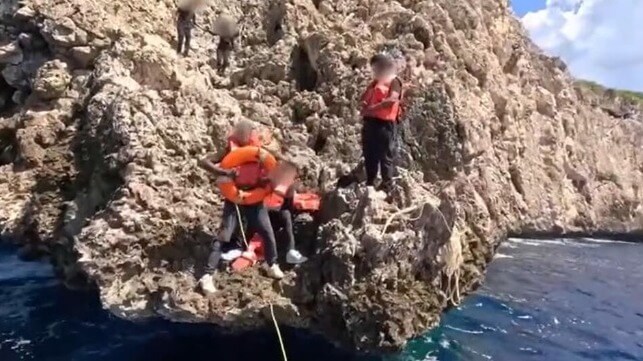U.S. Coast Guard Rescues 11 Migrants From the Cliffs of Monito Island

On Saturday, a U.S. Coast Guard cutter rescued 11 migrants from the rocky cliffs of Monito Island, an inhospitable nature reserve halfway between the Dominican Republic and Puerto Rico.
On Saturday, the fishing vessel Likeo contacted Sector San Juan to report that a group of people in orange shirts appeared to be stranded on the rocky cliffs of Monito Island. The command center dispatched a Jayhawk helicopter to survey the situation and diverted the cutter USCGC Richard Dixon to assist. The aircrew soon spotted the group on Monito and directed the Dixon to the location.
Surface conditions were calm - a requirement for approaching the rocky cliffs - so the crew of the Dixon launched their pursuit boat to carry out a rescue. They found six men and five women, all Haitian nationals, who were stranded on shore.
After countless interdictions at Monito Island, the Coast Guard has worked out a practical system for rescuing migrants from the cliffs. After passing out lifejackets to the group, the rescue boat's coxswain will approach, stand off about 10-15 feet from the rocks, and then have a crewmember toss a life ring on a line to one individual. When ready, the survivor jumps into the water, and the crew pulls him or her aboard with the line. The process is repeated until the whole group is safely aboard.
All 11 migrants were delivered safely to Mayaguez, Puerto Rico, where the U.S. Border Patrol took them into custody.
Monito Island is an uninhabited outcropping of American territory in the Mona Passage, and it has become a regular destination for migrant smugglers. Unscrupulous human traffickers regularly abandon their passengers on the island, leaving them some 40 nm short of an actual crossing to Puerto Rico.
"The dangers of illegal voyages in the Mona Passage are exponentially increased when smugglers leave their passengers abandoned for days in austere and dangerous environments like Monito Island," said Capt. José E. Díaz, Coast Guard Sector San Juan commander, in a statement last year. "Most do not realize the danger they are in until it is too late, as these voyages often take place aboard makeshift and grossly overloaded vessels with no lifesaving equipment."
No comments:
Post a Comment